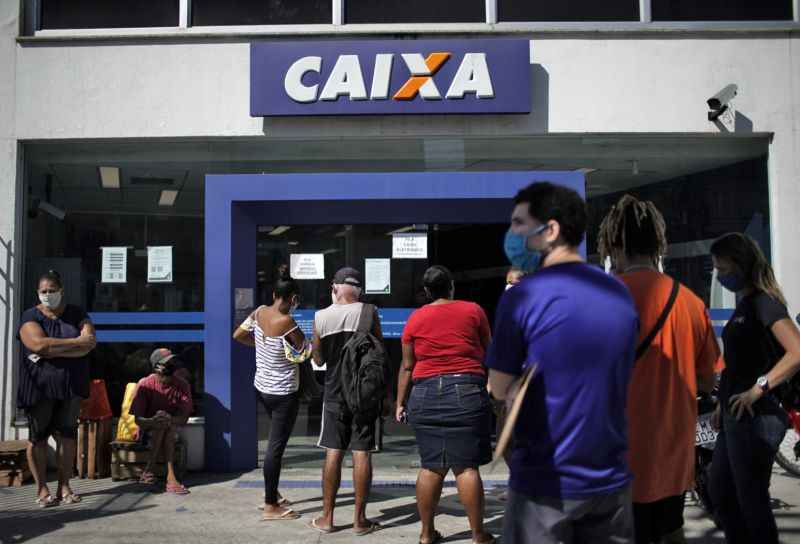RIO DE JANEIRO, BRAZIL – In some Latin American countries, the coronavirus pandemic did what campaigns and initiatives have for years failed to do: get millions of people to open their first bank account.
In Brazil, Colombia, Chile, and Costa Rica, people who want to receive economic assistance from the government during the confinement need a bank account in order to be paid. According to several experts, this greater financial inclusion can be beneficial for an economic rebound.
The most important progress so far has been observed in Colombia. According to the Banking and Financial Institutions Association of Colombia (ASOBANCARIA) during the health emergency months, 1.5 million people were incorporated into the financial system for the first time.

This raises the country’s banking rate to 85.6 percent. In Brazil, with a 70 percent banking rate, approximately two and a half million people opened their first bank account to receive government aid, according to data from the World Economic Forum.
Chile also reported progress. In a presentation in early July, the central bank reported that between March and May the number of checking accounts in the country increased by between 30 and 40 percent compared with the previous year. Its banking rate stands at 74.3 percent.
In Costa Rica, a country with a population of only five million people, 180,000 people joined the banking system in a month and a half, according to José Manuel Salazar Xirinachs, a former official of the World Labor Organization (ILO) who is part of a group of experts that advises the Central American government.
“It’s impressive,” says Salazar Xirinachs. “Most are casual and self-employed, for instance, housemaids, who in Costa Rica amount to about 125,000, of which a large majority lost their jobs.”
“The goal was to avoid obstacles, to make everything very simple and very direct. If one had a cellphone and a telephone, virtually everyone has that, right? That’s wonderful”, says the economist.
Costa Rica, like Colombia, allied itself with commercial banks so that the opening of a bank account did not require the client’s physical presence and could be handled through the government’s website. “The pandemic caused all this migration to digital transformation and this is a great example of a positive digital transformation.”
Economic health
“Access to a telephone, a bank account, and digital identification is increasingly central to economic health and, in some cases, a matter of survival,” says a United Nations report published on August 26th. “However, one or more parts of this digital survival kit are not yet available to nearly half the adult population, disproportionately women, in most developing countries.”
Among its most important findings, the UN points out that online banking services are usually cheaper and that the main beneficiaries should be the lower economic strata, which in many cases depend on remittances from abroad, for instance.
The World Bank says that 2.5 billion people in the world do not use formal financial services. Seventy-five percent of those living in poverty have no bank account. Both the institution and the United Nations, among other international organizations, state that inclusion is key to reducing poverty and driving development.
Internet penetration, on the other hand, is just as important; in Latin America, it is higher than banking. The bank reports that over half of the adults in the region have a cellphone, a higher percentage than the average in emerging economies.
In El Salvador, low banking led to a risky situation in April. When it announced that direct transfers were being offered to those most in need, hundreds of people crowded into bank branches to open an account to be able to receive the aid, exposing themselves to infection.
In Brazil, the process of delivering government aid needed to be adjusted, since only those with an account could withdraw the benefit. Initially, many people crowded the cashier’s lines to get the emergency aid.
Although there were no significant technological issues with requests for help, only minor website instability, thousands of users had problems registering because they did not have their taxpayer’s ID card in order. Within weeks, the system allowed the generation of more functional accounts that needed little documentation.
More savings
The economic development of a country depends, to a certain extent, on medium and small companies having access to loans that allow them to grow their business. Without people’s savings stored in banks, they are less able to lend, says Sebastián Nieto, head of the Organization for Economic Cooperation and Development for Latin America.
“This is good news,” says the expert over the phone from Paris. The crisis has taught countries an important lesson, as well as a digital infrastructure that can be used for other economic aid programs. “The main question now is to what extent can they become permanent in one way or another?”
“That means that if you can have this state aid, they’re reduced amounts anyway, and depending on how you link it to financial inclusion, these are deposits that you will have, but they’re not permanent savings, which is what I would like in relation to financial development in Latin America,” Nieto said.
Source: El País

